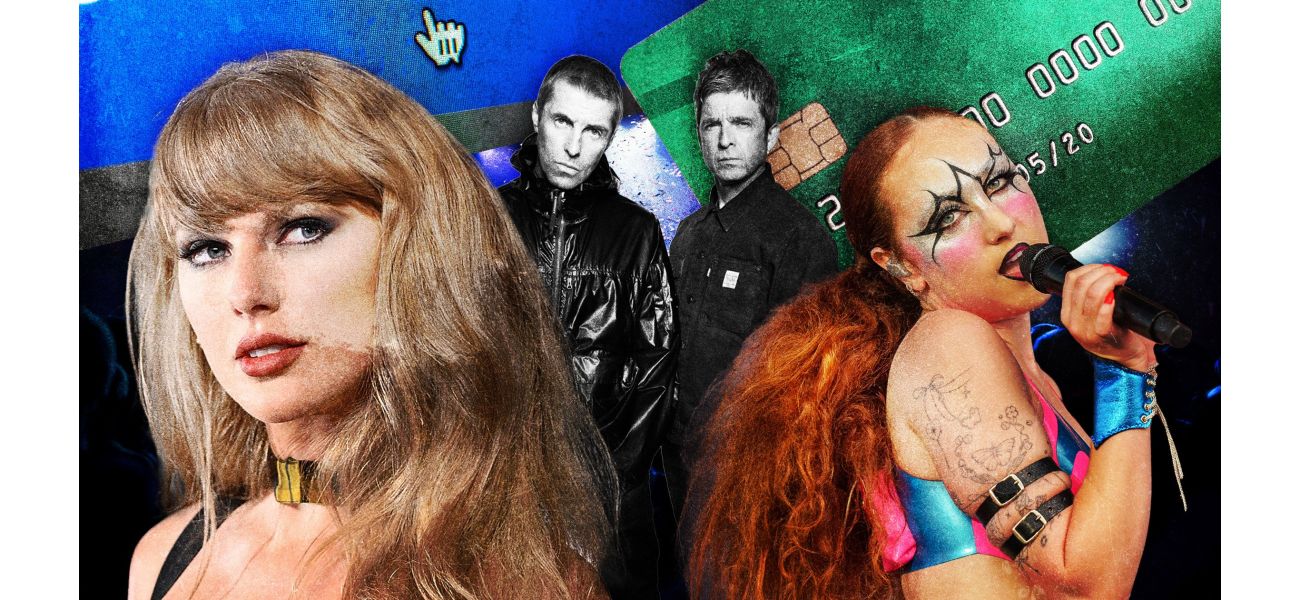Top experts warn of the main red flag to watch out for when purchasing concert tickets on the internet.
Stay alert and be cautious.
September 18th 2024.

Fans are being affected by the unethical actions of ticket scalpers, and it is important to know how to identify and avoid them. If you are currently considering purchasing tickets from someone on social media, please stop immediately and read this article. There are many red flags that can help you determine if the tickets you are buying are fake or legitimate, and it is essential to listen to them.
First of all, the only safe place to buy concert tickets is through an official ticketing website. This is the number one sign that the tickets are legitimate. Purchasing tickets through social media is never a good idea, even though it may seem like the only option when you are desperate to attend a sold-out event. For example, the current UK tour of Chappell Roan has become a prime target for ticket scams, with a Facebook group of 23,000 members selling tickets to her shows. Please do not buy these tickets on Facebook.
Chappell Roan's upcoming concerts in London have already sold out, and this has created a high demand for tickets. Unfortunately, this also means that people are willing to take advantage of desperate fans. The Agency has consulted with experts to provide valuable information for super-fans like you. It is important to know how to protect yourself from ticket scams when buying tickets online.
There are several ways in which ticket scams can occur. For instance, if you come across a social media post offering tickets at discounted prices or access to sold-out events, it is most likely a scam. In these situations, victims are often required to pay for the tickets upfront, only to never receive them or receive fake tickets that will not work. Furthermore, fraudsters often take over real social media accounts and use them to sell fake tickets to unsuspecting friends and family.
To avoid your own social media account from being hacked, it is recommended to set up two-factor authentication. This does not guarantee complete safety, but it does offer better protection than just using a single password. Additionally, it is crucial to never pay for tickets through social media, even if it appears to be a friend selling them. If the tickets are being sold at a significantly lower price than the official general sale, it is likely a scam.
Consumer expert Helen Dewdney has provided five ways to protect yourself while buying tickets online. It is important to buy from trusted retailers, such as the official ticket sellers or established resellers. Be cautious when buying from third-party sellers, and never buy tickets on social media. It is easy for scammers to fake tickets, and if an offer seems too good to be true, it probably is. Finally, use a credit card to pay for tickets, as this will provide you with coverage under the Section 75 of the Consumer Credit Act.
Helen Dewdney emphasizes that there is no safe way to buy tickets on social media. It is important to never give scammers even the slightest possibility of appearing legitimate. If you see tickets being sold on social media, assume it is a scam. Megan Searle, a former fraud investigator, also warns against letting the obsession of securing a ticket cloud your judgement. It is easy to get caught up in the hype and panic when tickets sell out quickly, but that is when you are most vulnerable to fraud.
Taylor Swift has recently provided a list of verified ticket sellers for her concerts, and it is important to follow the guidance of the artist or event website when it comes to purchasing tickets. If you cannot get a ticket through the official site, do not turn to social media or random websites. You never know who you are dealing with, and even if they provide you with a seemingly legitimate QR code, it could already be used. This could result in being turned away at the venue.
In the unfortunate event that you become a victim of concert ticket fraud, there are some measures you can take. If you bought tickets from a tout, you may not be able to get your money back unless you paid with a credit card. If the purchase was over £100, you should be covered under Section 75A of the Consumer Credit Act 1974. If you paid with a debit card or the purchase was under £100, you are not covered. Chargeback, although not a part of any law, is a voluntary scheme that your card issuer may or may not allow.
If you have a story to share, whether it be a celebrity story, video, or pictures, please get in touch with The Agency entertainment team. You can email, call, or visit their Submit Stuff page. They would love to hear from you. It is important to stay informed and protect yourself from ticket scams in order to have a positive concert experience.
First of all, the only safe place to buy concert tickets is through an official ticketing website. This is the number one sign that the tickets are legitimate. Purchasing tickets through social media is never a good idea, even though it may seem like the only option when you are desperate to attend a sold-out event. For example, the current UK tour of Chappell Roan has become a prime target for ticket scams, with a Facebook group of 23,000 members selling tickets to her shows. Please do not buy these tickets on Facebook.
Chappell Roan's upcoming concerts in London have already sold out, and this has created a high demand for tickets. Unfortunately, this also means that people are willing to take advantage of desperate fans. The Agency has consulted with experts to provide valuable information for super-fans like you. It is important to know how to protect yourself from ticket scams when buying tickets online.
There are several ways in which ticket scams can occur. For instance, if you come across a social media post offering tickets at discounted prices or access to sold-out events, it is most likely a scam. In these situations, victims are often required to pay for the tickets upfront, only to never receive them or receive fake tickets that will not work. Furthermore, fraudsters often take over real social media accounts and use them to sell fake tickets to unsuspecting friends and family.
To avoid your own social media account from being hacked, it is recommended to set up two-factor authentication. This does not guarantee complete safety, but it does offer better protection than just using a single password. Additionally, it is crucial to never pay for tickets through social media, even if it appears to be a friend selling them. If the tickets are being sold at a significantly lower price than the official general sale, it is likely a scam.
Consumer expert Helen Dewdney has provided five ways to protect yourself while buying tickets online. It is important to buy from trusted retailers, such as the official ticket sellers or established resellers. Be cautious when buying from third-party sellers, and never buy tickets on social media. It is easy for scammers to fake tickets, and if an offer seems too good to be true, it probably is. Finally, use a credit card to pay for tickets, as this will provide you with coverage under the Section 75 of the Consumer Credit Act.
Helen Dewdney emphasizes that there is no safe way to buy tickets on social media. It is important to never give scammers even the slightest possibility of appearing legitimate. If you see tickets being sold on social media, assume it is a scam. Megan Searle, a former fraud investigator, also warns against letting the obsession of securing a ticket cloud your judgement. It is easy to get caught up in the hype and panic when tickets sell out quickly, but that is when you are most vulnerable to fraud.
Taylor Swift has recently provided a list of verified ticket sellers for her concerts, and it is important to follow the guidance of the artist or event website when it comes to purchasing tickets. If you cannot get a ticket through the official site, do not turn to social media or random websites. You never know who you are dealing with, and even if they provide you with a seemingly legitimate QR code, it could already be used. This could result in being turned away at the venue.
In the unfortunate event that you become a victim of concert ticket fraud, there are some measures you can take. If you bought tickets from a tout, you may not be able to get your money back unless you paid with a credit card. If the purchase was over £100, you should be covered under Section 75A of the Consumer Credit Act 1974. If you paid with a debit card or the purchase was under £100, you are not covered. Chargeback, although not a part of any law, is a voluntary scheme that your card issuer may or may not allow.
If you have a story to share, whether it be a celebrity story, video, or pictures, please get in touch with The Agency entertainment team. You can email, call, or visit their Submit Stuff page. They would love to hear from you. It is important to stay informed and protect yourself from ticket scams in order to have a positive concert experience.
[This article has been trending online recently and has been generated with AI. Your feed is customized.]
[Generative AI is experimental.]
0
0
Submit Comment





